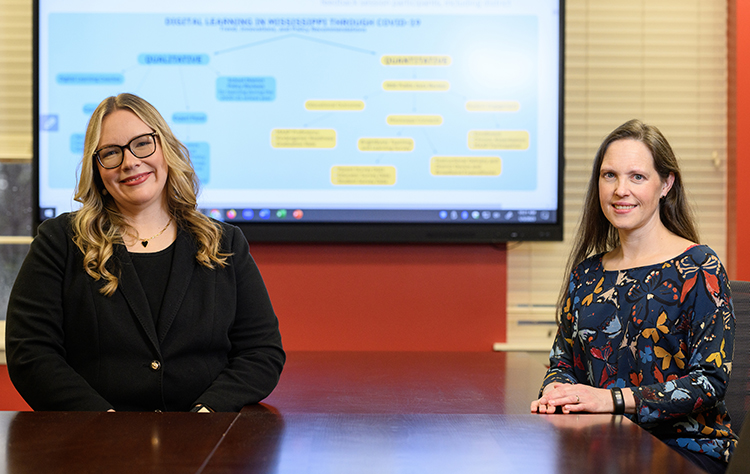
Sara Platt (left), University of Mississippi assistant professor of special education, and doctoral student Elizabeth Young Sweeney lead research into the use of technology in PK-12 education during the pandemic. The study, funded by a Governor’s Emergency Education Fund grant, found that distance learning, while difficult for some, can help other students thrive. Photo by Thomas Graning/Ole Miss Digital Imaging Services
University of Mississippi researchers probe technology spending, use during pandemic
Virtual and hybrid learning is a boon to student prosperity and continues to be a priority for state and local leaders. That is the main takeaway from state-funded research conducted by University of Mississippi education professors who analyzed the impacts of virtual learning during the COVID-19 pandemic.
In January 2021, the Governor’s Emergency Education Relief fund awarded the School of Education a $500,000 grant to study in-person, virtual and hybrid PK-12 instruction during the pandemic. More simply, researchers wanted to know, what did we learn?
“Technology is an amazing tool to enhance teaching and learning if used effectively,” said David Rock, UM education dean. “The pandemic caused one thing that I think is critical: it forced us into the 21st century whether we liked it or not.
“How are we going to use the lessons learned during the pandemic to help teachers and students across the country succeed?”
Sara Platt, assistant professor of special education, and doctoral student Elizabeth Young Sweeney led the research, which concluded in September 2022.
“What did we do right and what can we improve?” Platt said. “We cannot just say this is over and done. We’ve gotten this far. We can choose to plateau our efforts to integrate technology, or we can continue increasing our efforts and move upward.”
Among the study’s recommendations are:
- Create a state advisory task force to advance education that includes students, families, educators, and local and state leaders
- Emphasize the importance of high-quality instructional materials for distance learning
- Create regional acceleration hubs for collaboration across organizations and districts
“We have to look at this from a systematic approach, and we see that we have to have collaboration and continued study,” Platt said. “The devices might change, the tools might change, but we know that we have to have this collaboration among not only education but our outside partners.”
In July 2020, the Mississippi Legislature passed the Equity in Distance Learning Act, which allotted $150 million toward the purchase of nearly 400,000 devices for 148 of the 150 Mississippi school districts and aided 144 districts in expanding broadband support and access.
Before the pandemic, only 23 school districts reported a 1:1 student-device ratio. In 2021, 91% of students reported access to a computer and internet at home, according to Mississippi Connects.
While bolstering technology availability and support, the state also implemented digital learning coaches for teachers and school administrators on using technology in classrooms to better educate students. Teaching teachers and students to use the technology effectively was essential in the success of the virtual classroom, Platt said.
“I don’t want us to skip by that; this was a huge thing that Mississippi did,” she said. “Using free statewide digital learning coaches is something no other state did.”
But since the pandemic has ebbed, what happens next?
Some schools, such as the Gulfport School District, are including a separate virtual academy as an option for students.
Continued distance learning is essential for students with certain developmental or emotional disorders, students who are professional athletes and traveling often, and students with severe disease or disability. Virtual classes also can equalize the opportunity for students to take AP and college prep classes that their local school may not provide.
Schools that would once have closed due to snowfall or the chance of inclement weather can hold classes online, and some students simply learn more efficiently via virtual or hybrid models, Sweeney said.
Platt, a mother of two children who attended virtual classes during the pandemic, said one of her children thrived in distance learning while the other fell behind.
“It’s not a one-size-fits-all,” Platt said. “People learn differently. If we want to keep moving forward, we need to see that.”
The study – twice reviewed by a panel of experts in business, education, government and philanthropy – is already receiving national attention. After presenting a poster during the June 2022 International Society of Technology in Education conference in New Orleans, Platt was selected to give a full lecture presentation at the June 2023 conference in Philadelphia.
The information from the study also will be disseminated to educators at the Mississippi Educational Computing Association in February in Jackson.
The study is available for review at http://msdigitallearning.olemiss.edu.
By Clara Turnage




